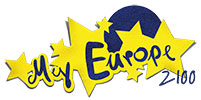November 8th, 2030 – Today marks the 15th anniversary of the “Protect People Not Borders” program. For this occasion, the President of the EU Council, Ms. Aïcha Benjelloun, delivered a speech on the current state of European immigration. She opened by saying: “When the ‘Protect People Not Borders’ program was introduced fifteen years ago, no one could have predicted the positive impact it would have on the EU. If someone had told me that I would be leading the EU Council one day, I would have laughed. I do not have a European name, yet I was born in the EU, as were both my parents. Nonetheless, in 2015 someone with North African origins could only dream of becoming influential on the EU political scene”. So how does someone who not so long ago belonged to an underserved minority become an important figure in politics and what does it have to do with immigration? That was the theme she would tackle in her 20 minute speech.
Ms. Benjelloun reminded European citizens of the tragedy that forced European countries to change their policies on immigration and ultimately brought an era of tolerance and economic stability to the EU: the deaths of 3,419 refugees while crossing the Mediterranean Sea in the course of 2014. Although many European countries continued to struggle with discrimination according to a study conducted by ENAR (European Network Against Racism), some passed a series of laws to protect the lives of refugees. The leaders of these countries had no idea that their decision would overturn the situation so dramatically. The President explained that although her grandparents did not follow the same path as the refugees when they came to Europe, she felt deeply tied to people who risked their lives when they embarked on poorly constructed boats to flee dreadful conditions in their home countries. “By voting in laws to welcome these people into our states, we became more tolerant towards different cultural backgrounds, which changed mindsets and helped European citizens to accept me as President of the EU Council”, she said.
These laws, known collectively as the “Protect People Not Borders” program, were signed by Belgium, Germany, Luxembourg, Sweden and The Netherlands in late 2015 and were strongly promoted by Amnesty International’s “S.O.S Europe” campaign. The program consisted of 7 resolutions: 1) the organisation of rescue missions throughout the Mediterranean Sea, 2) medical follow up for refugees upon arrival at a refugee center, 3) the opening of new refugee centers in the signatory countries, 4) increased facility of transfer between said centers, with priorities for families, 5) possibility of training for refugees based on their abilities, 6) compulsory education for children under 18, and 7) contracts with national enterprises to encourage the hiring of migrants at a fair wage.
Ms. Benjelloun also highlighted the positive impacts of these resolutions on the economy and society in the five Member States that initiated the project. “Many thought that migrants were an economic burden”, she stated. “On the contrary, according to the OECD (Organisation for Economic Co-operation and Development), a migrant contributes more in taxes than he receives in benefits”. Accordingly, the Member States that applied these changes saw their GDP increase by 8 % in 4 years. The Mediterranean countries also experienced rapid growth because the scheme provided jobs in sectors that dealt directly with the refugees on arrival, such as health and education. Improved integration of migrants was also associated with decreased violence rates as new refugee arrivals were accepted more readily and were less likely to be seen as a threat.
This situation encouraged ten additional Member States to apply these laws by 2020 and in 2022 the German Chancellor urged the European Council to extend the scheme to a European scale. Although this proposition was welcomed by most Member States, others voted against it. It took three years of intensive negotiations before the Istanbul Treaty was signed. Each Member State had to accept an immigration quota proportional to its size and population, open at least one refugee center, and include courses on different cultures in its schools’ curriculum.
In 2027, the Rabat Agreement, based on the Cotonou Agreement, was signed by the EU and African countries. It is a self-sustaining model that includes new economic deals, procedures to fight against Human Rights violations, and regulations that ensure the transfer of 35 % of the European taxes paid by African migrants to fund medical and educational infrastructures in their countries of origin.
Ms. Benjelloun closed her speech by evoking Europe’s next immigration challenge: Asia.
The President’s final words were: “These last fifteen years have been a real-life example of our motto ‘United in diversity’ and an inspiring motivation to continue to fight racism and discrimination in the future”.
